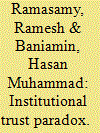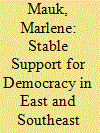|
|
|
Sort Order |
|
|
|
Items / Page
|
|
|
|
|
|
|
| Srl | Item |
| 1 |
ID:
108469


|
|
|
|
|
| Publication |
2011.
|
| Summary/Abstract |
Transnational Islamic organizations play a significant role in the lives of Germany's substantial Turkish Muslim population. Nonetheless the relation between these movements and German authorities is far from uniform. While the Milli Görüs, is the largest Turkish transnational Islamic movement in Germany, the much smaller Gülen Hareketi (Gülen movement) has been significantly more successful in gaining the acceptance of local and national authorities. While traditional explanations argue that the Gülen movement's "liberal," "educational Islam" has much more appeal to Western officials than the Milli Görüs,'s "anti-integrative," "political Islamism," this paper argues that institutional structure of the two movements has historically been a more important factor than their ideological platforms in whether they can gain the trust of German authorities. The learning centers and interfaith dialogue centers of the Gülen movement in Europe served as open, accessible, and neutral sites for German officials to visit and monitor, thereby enhancing communication and diminishing suspicion. In contrast, the mosque-based network of the Milli Görüs, served as a barrier between movement members and state officials. The structures in which the Milli Görüs, and Gülen movement operated thus produced radically different outcomes in their ability to signal German authorities of the movements' ideologies and intentions.
|
|
|
|
|
|
|
|
|
|
|
|
|
|
|
|
| 2 |
ID:
159760


|
|
|
|
|
| Summary/Abstract |
Ghana discovered oil in 2007 and began to produce and export it in commercial quantities in 2011. Following its oil discovery, scholars and experts feared Ghana might fall into the trap of the ‘natural resource curse’, the observed tendency for nations endowed with and heavily dependent upon oil or mineral resources to experience slow economic growth. Accordingly, various policy options to manage the oil revenues in order to avert an oil resource curse have been proposed. This paper uses data from the 2012 Afrobarometer Surveys (Round 5) in Ghana to explore the extent to which institutional trust and perceived corruption influence public preferences for cash transfers from Ghana’s oil revenues. Results from ordered logistic regressions reveal that a unit increase in perceived public corruption increases the odds that a respondent would ask that cash transfers be made to all Ghanaians from the oil revenues by about 1.3%.
|
|
|
|
|
|
|
|
|
|
|
|
|
|
|
|
| 3 |
ID:
190163


|
|
|
|
|
| Summary/Abstract |
The article explores institutional trust dynamics in Sri Lanka and asks what accounts for varying levels of trust different ethnic groups have in governance institutions in the post-war context. Three decades of ethnic conflict, the emergence of ethno-religious polarisation since the end of civil war, militarised ethnocracy, and the majoritarian ethnocratic state all highlight the need to understand these dynamics. The article presents the results of twonationally representative surveys on institutional trust in Sri Lanka (2015 & 2020), which showed a puzzling trend: in 2015, minorities had higher trust in public institutions, whereas, in 2020, the same minorities had lower trust. The study finds that citizens’ evaluation of public institutions is affected by ethnic cleavages, institutional fairness, and perceived performance. On the one hand, Sinhala–Buddhist ideology and dominance of ethnic majority in public institutions are more likely to determine institutional trust among the ethnic majority Sinhalese; on the other, perceived injustice and unfair treatment shapes institutional trust among the ethnic minorities. Overall, the study finds that an increase in institutional performance may not be sufficient; institutionalising equal treatment, fairness, and enhancing governance quality are necessary to enhance institutional trust among all ethnic groups in ethnically polarized societies.
|
|
|
|
|
|
|
|
|
|
|
|
|
|
|
|
| 4 |
ID:
188956


|
|
|
|
|
| Summary/Abstract |
The resilience of non-democratic regimes in the past decades demonstrates that some authoritarian regimes have figured out ways to consolidate regime support without democratic elections. Hong Kong is a remarkable case of “legitimacy without democracy” as the system of government enjoyed a certain level of legitimacy since colonial days without being democratically elected. Using Hong Kong as a case and based on data from several waves of Asian Barometer Survey (ABS), this study analyzes the impact of citizens’ evaluation of the economic conditions, perception of freedoms, perceived procedural justice and institutional trust, and stability concerns on diffuse regime support in Hong Kong. There are three key findings of this study. First, economic performance is not a significant predictor of diffuse regime support in the case of Hong Kong, whereas, second, institutional trust and perceived civil liberties are. Finally, we found indirect evidence for the role of stability in shaping regime support, although its importance seems far less important than institutional trust and civil liberties
|
|
|
|
|
|
|
|
|
|
|
|
|
|
|
|
| 5 |
ID:
187425


|
|
|
|
|
| Summary/Abstract |
Recent democratic regressions and crises suggest democracy is at risk across East and Southeast Asia. One of the factors that can determine democratic stability are citizens’ attitudes. While previous research has concentrated on support for democracy-in-principle, this contribution argues that it is political trust, i.e. support for democracy-in-practice, which is crucial for democratic stability. For democracies to be stable, political trust should be high as well as rooted in long-term factors like liberal democratic value orientations or social trust to protect it from short-term fluctuations following economic crises or political scandals. This contribution therefore examines not only the current levels and development of political trust but also whether it is influenced more by long-term factors (liberal democratic value orientations, social trust) or short-term factors (economic performance evaluations, incumbent support). The empirical analysis shows political trust in five East and Southeast Asian democracies (Indonesia, Japan, Mongolia, South Korea, Taiwan) to be mostly mediocre and primarily dependent on economic performance evaluations and incumbent support. Among the five democracies, citizens in Japan appear most resilient to democratic regressions; on the other hand, Taiwanese democracy seems least equipped to master future crises.
|
|
|
|
|
|
|
|
|
|
|
|
|
|
|
|
|
|
|
|
|